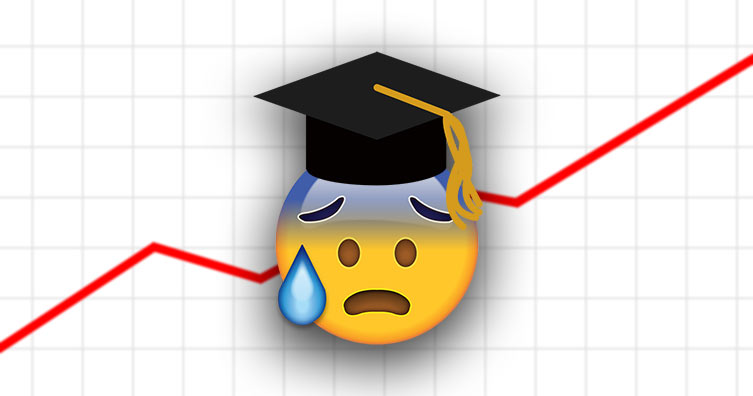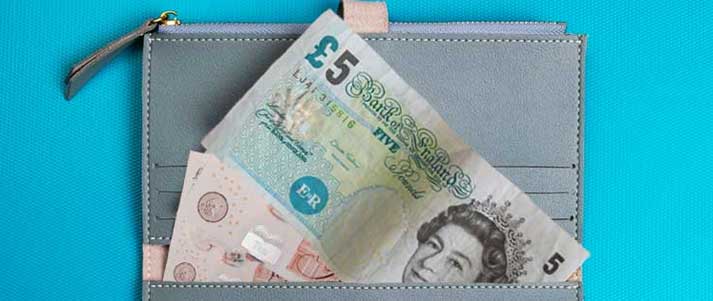Student Loan interest rates will RISE this year – here’s everything you need to know
From September, the interest rate on Student Loans is increasing to 5.6%. Wondering how that'll actually impact your loan repayments? We'll explain all...

Sorry to break up all the coronavirus news with a story that's not exactly the most uplifting – but the rise in Student Loan interest rates isn't quite as bad as it might first sound (we promise).
Student Loan interest rates change every September based partly on changes to the March RPI (Retail Price Index) from that year. And today, it's been announced that the RPI for March 2020 is up 0.2% from last year to 2.6%.
So, for students in England and Wales (where Student Loan interest is RPI + 3%), interest will go up to 5.6%. For students in Scotland and Northern Ireland, it's unlikely that there will be an increase to your Student Loan interest, but there are more factors at play which we'll go into below.
What's in this guide?
Changes to Student Loan interest rates
While RPI does affect how your Student Loan interest is calculated, a major part of knowing how much interest you'll be charged depends on when you went to uni and which part of the UK you're from.
Here's what to expect from Student Loan interest rates in 2020:
You're in England and Wales and started uni after 2012

Credit: Yevgen Kravchenko, kamui29, Bell Photography 423 – Shutterstock
Interest starts getting added to your Student Loan while you're still at uni (😢), and for English and Welsh students, the interest rate on your loan is set at RPI + 3%. For now, this figure is 5.4% (as RPI was 2.4% in March 2019), but in September, it will rise to 5.6%.
So, if you're still at uni, you will start getting charged interest of 5.6% on your loan during your studies.
Once you graduate, the interest rate changes to RPI + up to 3%.
Graduates earning less than £26,575
If you've graduated and you're earning under the repayment threshold of £26,575, you'll be charged interest at the rate of RPI.
At this point, it's worth highlighting that you don't start repaying your Student Loan until the April after you graduate, and even then you won't repay any of it until you're earning over £26,575 a year.
Plus, unless you start with a graduate salary of around £30,000 or more, it's unlikely that you'll repay your loan and interest in full before it's wiped after 30 years (in fact, it's been estimated that just 17% will).
Graduates earning over £26,575
Once you've started earning above the repayment threshold, you will be charged interest of RPI + up to 3%.
Anyone earning over £47,835 is charged the full RPI + 3%. Graduates on a salary between these two figures will accrue interest on a sliding scale from RPI up to RPI + 3%.
As we mentioned earlier, RPI + 3% is currently 5.4%, but in September it will go up to 5.6%. This means that the max interest a graduate will be charged will be 5.6%, with anyone earning between £26,575 and £45,000 charged between 2.6% (RPI) and 5.6% depending on their salary.
English and Welsh students who started uni before 2012, or any Scottish and NI students

Credit: Atanas Bezov - Shutterstock
For Scottish and Northern Irish students, or any English and Welsh students who went to uni between 1998 and 2011, Student Loans are on what's known as the Plan 1 repayment system (as opposed to Plan 2 which English and Welsh Student Loans are currently on).
The interest rate on your loan is currently set at just 1.1% and, unlike for recent English and Welsh students, it'll likely stay the same in September – but it's impossible to say for sure at this point.
This is because your interest rate is set at whichever is lowest out of RPI or the Bank of England's base rate + 1%. As the Bank of England's base rate is currently 0.1%, it looks like the change in RPI is unlikely to make a difference to your Student Loan repayments.
But, the current economic climate is very uncertain. In March 2020, the Bank of England base rate changed twice in response to the coronavirus outbreak so we can't say for sure that it won't change again before September.
Note: If you're on Plan 1, bear in mind that you won't start repaying your loan until you're earning over £19,390.
Should you be worried about Student Loan interest?

Credit: TierneyMJ – Shutterstock
It's important to recognise that a rise in interest rates can be worrying news to hear for a lot of students and graduates, and many will find the growing figures on their loan repayment invoices to be disconcerting.
But, as we touched on earlier, it's been estimated that 83% of students will never repay their loans in full before the debt's cleared. So, as it's unlikely you'll repay the loan in full before it's wiped, added interest should make very little difference to the overall amount you repay.
For example, if you're unlikely to repay your loan anyway, it doesn't really matter whether the interest rate is 5.6%, 56% or 56,000,000% – it gets cancelled after 30 years, regardless of how much or how little you've paid back.
However, if you're on a high salary and you have a good chance of repaying your loan in full, it's worth keeping in mind that increased interest could slightly extend the length of time you spend paying it back.
Here's how our resident student money expert, Jake Butler, has responded to the news:
Whilst an increase in the interest in Student Loans may seem alarming, especially given the current economic climate due to COVID-19, it's really important that students and graduates remember it's not as significant as it appears.
Students should be aware that the interest changes make very little difference to what they'll actually end up paying back.
Many studies show that the majority of grads will never pay back their whole loan before it's wiped after 30 years, so any small fluctuations in interest just add or take away from a pile of money that'll never be paid back anyway.
Rather than a monetary problem, it's more of a psychological one and this change will do very little to make students, who are already stressed, feel at ease.
Once again this highlights a broken Student Loan system, one that seems to be constantly "under review".
If there's anything else you're unsure on, our full guide to repaying your Student Loan has all the info you need.









